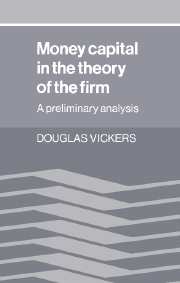Book contents
- Frontmatter
- Contents
- Preface
- PART I Theoretical issues and analytic motivation
- PART II The neoclassical tradition
- 4 Production, pricing, investment, and financing interdependence in the firm
- 5 Probability, risk, and economic decisions
- 6 Utility, uncertainty, and the theory of choice
- 7 Financial asset markets and the cost of money capital
- 8 The cost of money capital: further analysis and controversy
- 9 The investment expenditure project
- PART III Postclassical perspectives
- References
- Index
4 - Production, pricing, investment, and financing interdependence in the firm
Published online by Cambridge University Press: 18 September 2009
- Frontmatter
- Contents
- Preface
- PART I Theoretical issues and analytic motivation
- PART II The neoclassical tradition
- 4 Production, pricing, investment, and financing interdependence in the firm
- 5 Probability, risk, and economic decisions
- 6 Utility, uncertainty, and the theory of choice
- 7 Financial asset markets and the cost of money capital
- 8 The cost of money capital: further analysis and controversy
- 9 The investment expenditure project
- PART III Postclassical perspectives
- References
- Index
Summary
The theory of the firm in a real-time, money-using economy must be grounded in the interdependent theories of production, capital investment, and finance. Traditionally, the theory of the firm has begun its analysis of production by positing a Marshallian short-run period in which, as the real capital employed in the firm was given and fixed, attention could focus on choosing the variable-factor inputs with which to produce specified levels of output. Then, at a later stage, the assumptions of the Marshallian long run took account of the possibility or desirability of varying the fixed factors also.
The problem in this scheme of things is that no significant place exists for money capital. The real capital–money capital dichotomy is not addressed. No meaningful discussion is given of the need for money capital, the sources from which it might be obtained, and the manner in which the cost and availability of it constrain the firm's structural and operating decisions. The Marshallian short-run and long-run fictions did, of course, point in the direction of an accounting for real time, as did Marshall's concern for the evolution, growth, and decay of firms. But the analogy of the “trees of the forest” (Marshall, 1920, p. 315f.), together with that of the representative firm, effectively collapsed the real-time argument to a timeless form and prepared it for Pigou's notion of the optimum size of the firm and its equilibrium condition (see Robinson, 1969, pp. v–vi).
- Type
- Chapter
- Information
- Money Capital in the Theory of the FirmA Preliminary Analysis, pp. 59 - 81Publisher: Cambridge University PressPrint publication year: 1987



